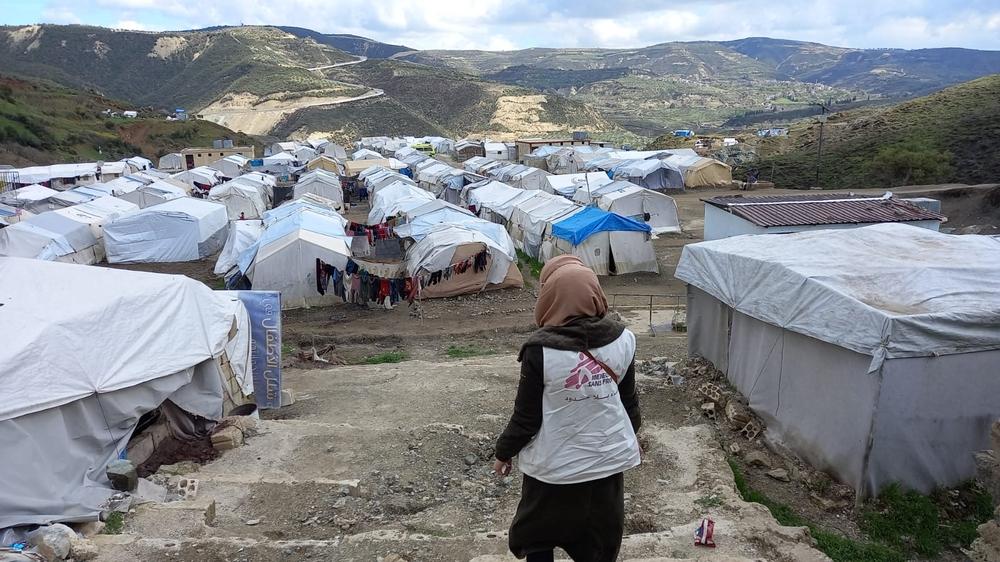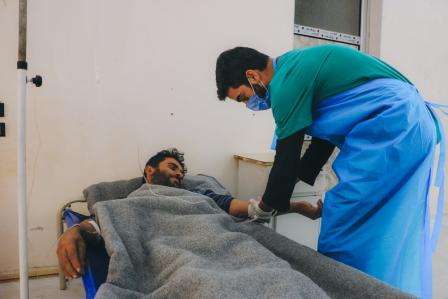Syria: After 15 years, Cholera appears again in the country

© MSF
Since September 2022, parts of Syria including northeast Syria (NES) and northwest Syria (NWS) have been facing a major cholera outbreak. First linked to the contaminated water near the Euphrates River and the severe water shortage in the north of Syria, the outbreak has now spread across the country, and more than 13,000 suspected cases have been reported, including 60 deaths (as of 14 October).
According to Raqqa National Hospital, this is the first-time cholera has been confirmed in NES since 2007.
Responding to the outbreak
In northeast Syria, MSF is responding to the outbreak in partnership with local health authorities, including providing support to a 40-bed cholera treatment centre (CTC) in Raqqa, with a recently increased capacity of 65 beds. Within the first two weeks, almost 600 patients were admitted, of which a third were severely ill and another third were treated as outpatients.
In northwest Syria, our teams have been responding to the outbreak since September, by conducting community-based health promotion activities as well as preparatory trainings of relevant healthcare workers. We are currently supporting a Cholera Treatment Unit (CTU) and setting up two others to isolate and treat patients in Idlib and Aleppo governorates. In addition, we operate and support five Oral Rehydration Points (ORPs) points to provide the first level of treatment to patients. We have distributed preventive hygiene kits (water jerrycans, soap and chlorine tablets) to more than 20,000 families in displacement camps, where we also test water and support clean water points in the community. In Tal Abyad and Ras Al-Ain, we support a local organization to engage the community and distribute hygiene kits to families.
Extremely contagious, cholera is caused by ingesting bacteria of faecal origin – Vibrio cholerae – found in dirty or stagnant water. Causing diarrhoea and vomiting, cholera leads to rapid dehydration and, without prompt care, can kill within hours.
Staff and supply have been increased and Doctors Without Borders is working together with other local organisations supporting water and sanitation, including the chlorination of water trucks, water quality assurance, and supporting wastewater stations with chlorination processes. Epidemiological data is being used to identify areas in Raqqa that are more affected than others in order to identify priority areas for support. Assessments have also started in Hassakeh. Although people there are not dependent on the Euphrates River, water comes from boreholes and is distributed into the communities by water trucks. Yet access to clean water can still be difficult as it is possible for a water truck to unwittingly source contaminated water.
While the 4.4 million people living in northwest Syria fear another harsh winter, the recent escalation of fighting, and the disruption of cross-border aid, the cholera outbreak is adding another layer of complexity to an already dreadful humanitarian situation. As access to health care and to water and sanitation services has been severely affected by the ongoing conflict, the main challenge today is the health system's ability to deal with another outbreak, amidst funding shortfalls and enormous health needs.
Across NES and NWS, local and international humanitarian organisations are trying to fill the gaps and respond to the many needs, but the overall accessibility to sufficient and clean water remains a concerning issue. In 2021, water, sanitation and hygiene (WASH) operations represented only four per cent of the entire humanitarian response budget for the whole of Syria, which is less than one-third of what was spent in 2020 for the same activities.
Spreading awareness to the community
As it has been 15 years since the last cholera outbreak in Syria, awareness raising about how it spreads, and how to treat it, is essential.
This is why a group of community workers in northern Syria, now working in the CTC, are meeting with patients and their families, discussing how to prevent the spread of cholera, and answering their questions. Their message is that even if access to clean water and sanitation infrastructure remains challenging in in northern Syria, there are several simple and effective measures that people can take to protect themselves. The community workers explain the importance of handwashing before and after meals, and of washing and cooking fruit and vegetables at a high temperature to kill any bacteria. They also explain how to recognise the early symptoms of cholera, and what to do if they suspect that they or a family member has caught the disease.
Following 11 years of war, a record 14.6 million people need humanitarian assistance in Syria. It is the country with the largest number of internally displaced people (IDPs) in the world, with 6.9 million IDPs, most of whom are women and children. Many have been displaced repeatedly and live in precarious conditions. Doctors Without Borders operates in Syria where we can, but ongoing insecurity and access constraints continue to severely limit our ability to provide humanitarian assistance that matches the scale of the needs. Our repeated requests for permission to operate in areas controlled by the Syrian Government have not been granted. In areas where access could be negotiated, such as northwest and northeast Syria, we run and support hospitals and health centres, and we provide healthcare through mobile clinics.
